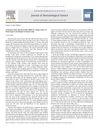 11 citations,
March 2019 in “EMBO molecular medicine”
11 citations,
March 2019 in “EMBO molecular medicine” A defective protein in progeria causes cell death and atherosclerosis, but a treatment targeting cell stress may reduce these effects.
 4 citations,
April 2010 in “Expert review of dermatology”
4 citations,
April 2010 in “Expert review of dermatology” Restoring immune privilege in hair follicles could help treat certain types of hair loss.
October 2022 in “Academic journal of science and technology” Stem cells, especially from fat, show promise for treating hair loss.
 68 citations,
June 2005 in “Expert Opinion on Therapeutic Targets”
68 citations,
June 2005 in “Expert Opinion on Therapeutic Targets” Oestrogens help maintain healthy skin, heal wounds, and may protect against skin aging and cancer.
 3 citations,
July 2021 in “Life science alliance”
3 citations,
July 2021 in “Life science alliance” PNKP is essential for keeping adult mouse progenitor cells healthy and growing normally.
 February 2023 in “International Journal of Molecular Sciences”
February 2023 in “International Journal of Molecular Sciences” Exosomes from skin cells can boost hair growth by stimulating a gene called LEF1.
 28 citations,
August 2018 in “BMC genomics”
28 citations,
August 2018 in “BMC genomics” DNA methylation changes are linked to hair growth cycles in goats.
 45 citations,
April 2019 in “International Immunology”
45 citations,
April 2019 in “International Immunology” The study concluded that immune cells attacking hair follicles cause hair loss in alopecia, with genetics and environment also playing a role, and highlighted the potential of certain treatments.
 28 citations,
March 2019 in “Journal of Dermatological Science”
28 citations,
March 2019 in “Journal of Dermatological Science” The document concludes that while lab results for hair growth promotion are promising, human trials are needed and better testing methods should be developed.
 14 citations,
February 2021 in “Experimental Dermatology”
14 citations,
February 2021 in “Experimental Dermatology” Cannabinoid receptor-1 signaling is essential for the survival and growth of human hair follicle stem cells.
 8 citations,
September 2021 in “EMBO Molecular Medicine”
8 citations,
September 2021 in “EMBO Molecular Medicine” A new small peptide may help hair growth by activating a specific receptor and should be tested in humans.
1 citations,
November 2022 in “Journal of Investigative Dermatology” ALRN-6924 may prevent hair loss caused by chemotherapy.
 56 citations,
March 2015 in “Journal of Investigative Dermatology”
56 citations,
March 2015 in “Journal of Investigative Dermatology” Healthy mitochondria in skin cells are essential for proper hair growth and skin cell interaction in mice.
 41 citations,
June 2010 in “Clinics in Dermatology”
41 citations,
June 2010 in “Clinics in Dermatology” Smoking harms skin health, causing slower wound healing, more wrinkles, and worsening some skin conditions, but may protect against certain others.
 April 2018 in “The journal of investigative dermatology/Journal of investigative dermatology”
April 2018 in “The journal of investigative dermatology/Journal of investigative dermatology” Ginseng and Albizia extracts may help prevent age-related hair thinning.
 15 citations,
August 2017 in “International Journal of Molecular Medicine”
15 citations,
August 2017 in “International Journal of Molecular Medicine” Panax ginseng extract may help prevent hair loss caused by DKK-1.
 January 2018 in “Stem cell biology and regenerative medicine”
January 2018 in “Stem cell biology and regenerative medicine” ATP-dependent chromatin remodeling is crucial for skin development and stem cell function.
 12 citations,
May 2023 in “EMBO reports”
12 citations,
May 2023 in “EMBO reports” High mTORC1 activity slows hair growth and causes it to lose color.
 31 citations,
February 2014 in “Journal of dermatological science”
31 citations,
February 2014 in “Journal of dermatological science” Placental growth factor may help treat hair loss.
 19 citations,
December 2015 in “Journal of Materials Chemistry B”
19 citations,
December 2015 in “Journal of Materials Chemistry B” Scientists have created a method to deliver specific cells that can regenerate hair follicles, potentially offering a new treatment for hair loss.
 January 2022 in “Biomedical Reports”
January 2022 in “Biomedical Reports” Inaudible sound at 30 kHz can boost hair growth and decrease hair loss by promoting cell growth and reducing cell death in hair follicles.
 48 citations,
June 2013 in “Journal of Dermatological Science”
48 citations,
June 2013 in “Journal of Dermatological Science” Valproic acid may help hair grow and could be a safe treatment for hair loss.
 5 citations,
November 2020 in “Frontiers in Cell and Developmental Biology”
5 citations,
November 2020 in “Frontiers in Cell and Developmental Biology” The "Two-Cell Assemblage" assay is a new, simple method to identify substances that may promote hair growth.
 June 2023 in “Stem cell reviews and reports”
June 2023 in “Stem cell reviews and reports” Stem cell therapies could be a promising alternative for hair loss treatment, but more research is needed to understand their full potential and safety.
 11 citations,
October 2021 in “Frontiers in Cell and Developmental Biology”
11 citations,
October 2021 in “Frontiers in Cell and Developmental Biology” Non-coding RNAs are important for hair growth and could lead to new hair loss treatments, but more research is needed.
 29 citations,
May 2020 in “npj Regenerative Medicine”
29 citations,
May 2020 in “npj Regenerative Medicine” Immune cells help regulate hair growth, and better understanding this can improve hair loss treatments.

Certain natural products may help stimulate hair growth by affecting stem cell activity in the scalp.
1 citations,
August 2016 in “Journal of Investigative Dermatology” Vδ1+ T-cells in the skin contribute to hair loss in alopecia areata and could be targeted for treatment.
 4 citations,
September 2012 in “Journal of dermatological science”
4 citations,
September 2012 in “Journal of dermatological science” The hair follicle's connective tissue is a key source of a certain collagen in human scalp skin.


























